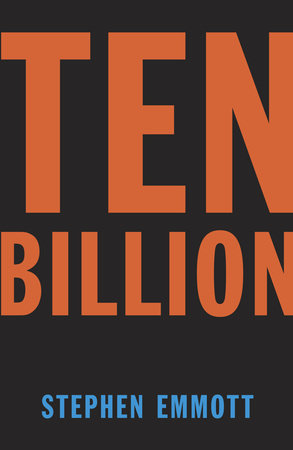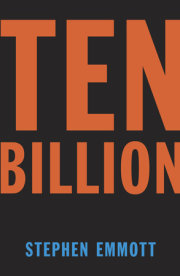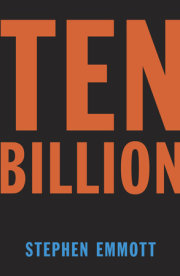This is a book about us.
It’s a book about you, your children, your parents, your friends. It’s about every one of us. It’s about our failure: failure as individuals, the failure of business, and the failure of our politicians.
It’s about the unprecedented planetary emergency we’ve created.
It’s about the future of us.
Earth is home to millions of species.
Just one dominates it. Us.
Our cleverness, our inventiveness, and our activities have modified almost every part of our planet. In fact, we are having a profound impact on it.
Indeed, our cleverness, our inventiveness, and our activities are now the drivers of every global problem we face.
And every one of these problems is accelerating as we continue to grow toward a population of ten billion.
In fact, I believe we can rightly call the situation we’re in right now an emergency—an unprecedented planetary emergency.
This is the reason I have written this book.
I am a scientist.
I lead a lab, in Cambridge, England, which is home to a unique collection of amazing young scientists. We conduct research into complex systems, including the climate system and ecosystems, as well as the impact of us humans on the earth.
Science is ultimately about
understanding. And this is what we try to do: to understand the earth’s climate, and the behavior of the earth’s terrestrial and marine ecosystems—from its microbial communities to its forests—and to predict how these vital planetary systems will respond to change.
Change caused by us.
We humans emerged as a species about 200,000 years ago. In geological time, that is really incredibly recent.
Just over 10,000 years ago, there were one million of us.
By 1800, just over two hundred years ago, there were one billion of us.
By 1960, fifty years ago, there were three billion of us.
There are now over seven billion of us.
By 2050, your children, or your children’s children, will be living on a planet with at least nine billion other people.
Sometime toward the end of this century, there will be at least ten billion of us. Possibly more.
How did we get to where we are now? We got to where we are now through a number of civilization- and society-shaping “events”; most notably, the agricultural revolution, the scientific revolution, and—in the West—the public-health revolution.
These events have fundamentally shaped how we live, and have fundamentally shaped our planet. Their legacy will continue to shape our future. So we need to look at our growth and activities through the lens of these developments.
By 1800 the global population had reached one billion. One of the principal reasons for this growth was the invention of agriculture. The “agricultural revolution” enabled us to go from being hunter-gatherers to highly organized producers of food, and allowed our population to grow.
A useful way to think of the development and importance of agriculture is in terms of at least three agricultural “revolutions.” The first took place over 10,000 years ago. This was the domestication of animals and the cultivation of plant types.
The second agricultural revolution was between the fifteenth and nineteenth centuries. This was a revolution in agricultural productivity and the mechanization of food production.
The third happened between the 1950s and 2000s; the so-called “green revolution.”
But there’s another story here: the start of a fundamental transformation—of land use—by humans.
One hundred and thirty years later, we had grown to two billion. It was 1930. The impact of another revolution—the industrial revolution—was being felt. The world was being transformed by manufacturing, technological innovation, new industrial processes, and transportation.
The continuing expansion of agriculture and the revolution in public health enabled us to continue to grow—rapidly.
But there’s another story here too: the start of our lethal addiction to coal, oil, and gas as our principal sources of energy.
Thirty years later, we had grown to three billion. It was 1960, and we were in the middle of a food revolution. There were more of us. Far more of us. We needed more food. Far more food. More than the established agricultural system could provide.
What became known as the green revolution provided this extra food.
It did so through:
The industrial-scale use of chemical pesticides, chemical herbicides, and chemical fertilizers;
an unprecedented expansion of land use;
and the wholesale industrialization of the entire food production system. This included the industrialization of raising and harvesting animals for food, from the rise of industrial-scale “factory fishing” fleets to battery farming of pigs, poultry, and beef.
This revolution came at a huge cost to the environment, in terms of:
loss of habitat;
pollution;
overfishing.
It also set in motion an unprecedented decline of species and the start of the degradation of entire ecosystems.
By 1980, twenty years later, there were four billion of us on the planet. The green revolution had produced much more food. That made food cheaper.
In turn, that meant we had more money to spend. And we had started to spend it on “stuff”: televisions, video recorders, Walkmans, hair dryers, cars, and clothes. And we also started to spend it on vacations. Far more vacations.
At the center of this spending spree was the astonishing growth of transportation.
In 1960 there were 100 million cars on the world’s roads—by 1980 there were 300 million.
With this came a massive expansion of road net- works—carving up entire countries, further increasing loss of habitat for other species.
In 1960 we flew 62 billion passenger miles. In 1980 we flew 620 billion passenger miles.
Global shipping grew at a similarly astonishing rate. All of the stuff we were buying, plus all of the food we were consuming, plus all the raw materials and resources required to make everything was being shipped around the world.
Just ten years later, in 1990, there were five billion of us. By this point, initial signs of the consequences of our growth were starting to show.
Not the least of these was on water.
Our demand for water—not just the water we drank, but the water we needed for food production and to make all the stuff we were consuming— was going through the roof.
But something was starting to happen to water. Back in 1984, journalists reported from Ethiopia about a famine of biblical proportions caused by widespread drought.
That, it seemed, was “over there,” in Africa. Except that it wasn’t just happening “over there,” in Africa. Unusual drought, and unusual flooding, was increasing everywhere: Australia, Asia, Europe, the United States.
Water, a vital resource we had thought of as abundant, was now suddenly something that had the potential to be scarce.
By the year 2000, there were six billion of us. By this point it was becoming clear to the world’s scientific community that the accumulation of CO2, methane, and other green- house gases in the atmosphere—as a result of agriculture, land use, and the production, processing, and transportation of everything we were consuming—was changing the climate. And that, as a result, we had a serious problem on our hands.
Copyright © 2013 by Stephen Emmott. All rights reserved. No part of this excerpt may be reproduced or reprinted without permission in writing from the publisher.










